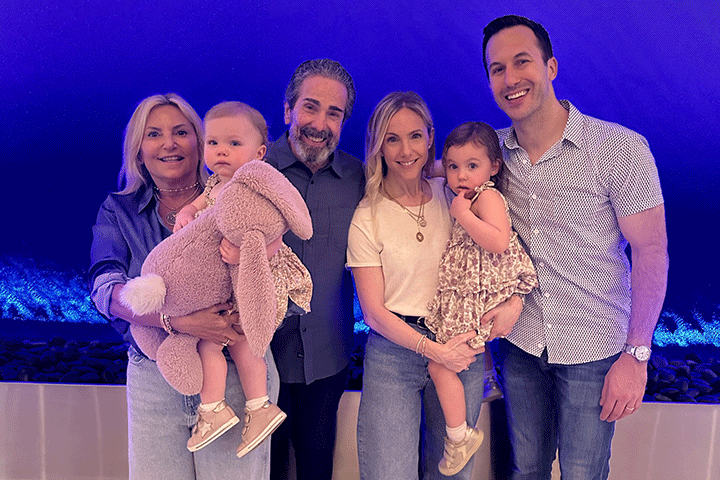New Immunotherapy Strategy Aimed at High-Risk Population

Despite the myriad debates surrounding vaccines, it’s almost impossible to deny that vaccines have been and continue to be one of medicine’s greatest success stories.
Illnesses like polio, measles, chicken pox, mumps, diphtheria, tetanus, pertussis, and rubella, among others, have been largely mitigated in the US due to vaccination programs. And COVID-19 vaccines have proven to be extraordinarily effective at reducing hospitalizations and deaths during the pandemic.
It’s clear that sometimes our immune system needs some help. Enter vaccines, which, in simplest terms, are biological preparations that provide us what’s called active acquired immunity to a particular disease. Active immunity occurs when our own immune system protects us from a pathogen. In other words, a vaccine prods our immune system to find an invader and eliminate it.
Cancer Cells Evade the Immune System
Cancer cells are among the most powerful of invaders. They grow, divide, and multiply while hiding from the immune system. Pancreatic cancer cells are masters of this evasion. Because vaccines can be very powerful tools, it makes sense that physician–scientists are exploring their use in cancer research and treatment. Today, there are two vaccines approved by the FDA to protect against the development of certain cancers. The HPV vaccine protects against the human papillomavirus (HPV) and is designed to prevent cervical, vaginal, vulvar, and anal cancers, all of which are caused by the HPV virus. Another approved vaccine protects against the hepatitis B virus, a cause of liver cancer.
There is significant ongoing research in using vaccines against pancreatic cancer, one of the most deadly of malignancies. A new pancreatic cancer prevention trial dubbed Mutant Kirsten Rat Sarcoma (KRAS)-Targeted Long Peptide Vaccine for Patients at High Risk of Developing Pancreatic Cancer is set to begin at the Sidney Kimmel Comprehensive Cancer Center at Johns Hopkins (Baltimore, Maryland). It is designed to see if a peptide vaccine targeted to recognize the KRAS mutation in pancreatic cancer can stop the disease from ever gaining a foothold among those at greatest risk.
The KRAS mutation is an error in a protein in normal cells. It’s called KRAS because it was first identified as causing cancer in Kirsten rat sarcoma virus. The job of KRAS is to serve as an information hub for cell signaling, regulating cell growth and other normal cell processes. When KRAS mutates, which occurs in more than 90 percent of pancreatic cancers, that signaling is disrupted, leading to uncontrolled cell growth and cancer.
Amino acids are the building blocks of proteins, and peptides are chains of two to 50 amino acids on average. There are many different types of peptides, all of which play different roles in the human body. Peptides can also be synthesized or made in a lab. Some peptides are used in medications to treat high blood pressure and type 2 diabetes, among other ailments. The peptide-based cancer vaccine in this trial uses synthesized peptides that are known to be able to produce an immune response, which can then fight the malignancy.
New Trial Based on Years of Research
Much of the work in pancreatic cancer immunotherapy has been done at Johns Hopkins. “The question really isn’t will a pancreatic cancer immunotherapy like a vaccine work. Rather, it’s when,” says Elizabeth Jaffee, M.D., who is among the world’s leaders in pancreatic cancer vaccine research. “If you look historically, immunotherapies including immune checkpoint inhibitors and CAR T cells have already turned terrible cancers into more manageable chronic diseases. About 20 percent of cancers, including malignant melanoma and non-small cell lung cancers, respond to current immunotherapies.”
Pancreatic cancer is a tough nut to crack. And up until recently, immunotherapy hasn’t played much of a role in its treatment. That could change sooner rather than later. “I am not exaggerating when I say we’ve made significant progress in our understanding of how pancreatic cancers avoid immune recognition,” adds Jaffee, professor of oncology at Johns Hopkins and Deputy Director at the Kimmel Cancer Center.
“We’ve developed strategies that can result in real treatment effects, and we’re testing those strategies. There are so many new technologies that have helped us identify the cells and the signals expressed by those cells that inhibit immune recognition. And our clinical trials are trying to find ways to bypass those signals that inhibit the immune system from doing its job.”
A Potential Game-Changer for Those at High Risk
The lead investigator of the vaccine prevention trial is Neeha Zaidi, M.D., who is also conducting a trial to learn whether a vaccine she and her colleagues developed can catch pancreatic cancer in its earliest stages. “I’m definitely excited about this. Preventing pancreatic cancer in a known high-risk population is key and could be a complete game- changer,” says Zaidi, an assistant professor of oncology who specializes in gastrointestinal oncology and works closely with Jaffee. But she and Jaffee both caution that these trials are very early-stage.
“Pancreatic cancer is a very frustrating disease because so many patients we see present with advanced cancers,” Zaidi adds. “Catching the cancer would give people the best chance at longer-term survival, even a cure. Those who are at high risk for its development are monitored very well, but surveillance is not perfect.”
The vaccine uses proteins expressed by the KRAS mutation. The mutation, says Zaidi, nearly always appears in the very earliest stages of pancreatic cancer development. For people who have a family history of the disease, screening for this mutation could dramatically change outcomes.
“The foundation for this trial was laid with the preclinical mouse work showing that targeting this driver mutation, which is mutated KRAS, is actually present at premalignant stages,” she explains. “By targeting, you can slow development from precancerous to invasive.” In one ongoing study Zaidi and the Johns Hopkins’ team are using the same peptide vaccine for mutant KRAS in a cohort of patients who underwent surgery and standard of care treatments.
The vaccine is designed to teach the patient’s immune system to recognize the mutated KRAS gene as an intruder, something that doesn’t belong. When the immune system learns to recognize the proteins expressed by the mutated gene, it sends T cells to shut those proteins down. “One of the things that is important about mutant KRAS is that it takes at least a decade from this first genetic alteration for a precancerous lesion in the pancreas to become malignant,” Zaidi explains. “That’s a huge window of opportunity and one that can be exploited.”
Since the trial is in its infancy, “even if this goes to plan, it could be a decade before this reaches the clinic,” says Jaffee. Unlike the COVID-19 vaccine, for example, in which doctors could look at antibody levels as biomarkers for disease mitigation, pancreatic cancer vaccines currently don’t have a relatively simple biomarker to determine efficacy, she explains, though that research is also underway. “What we do believe is that the vaccine is very safe,” she adds. ”And we are optimistic about its efficacy.”
About the Study
The study participants will receive primary doses of the KRAS peptide vaccine on weeks 1, 3, and 5. Booster vaccinations will be administered at week 13. Participants will also receive a drug called poly-ICLC, which is designed to stimulate the immune system and is part of the vaccine. Since this is a phase I study, the primary endpoints include drug safety and tolerability, as well as measurable changes in mutant-KRAS-specific CD8 T cells and CD4 T cells. The main difference between CD4 and CD8 T cells is that the CD4 T cells are the helper T cells, which assist other blood cells to produce an immune response, and CD8 T cells are the cytotoxic T cells that induce cell death either by lysis or apoptosis.
The study is funded by the Pancreatic Cancer Collective, a partnership between Stand Up To Cancer and the Lustgarten Foundation.





